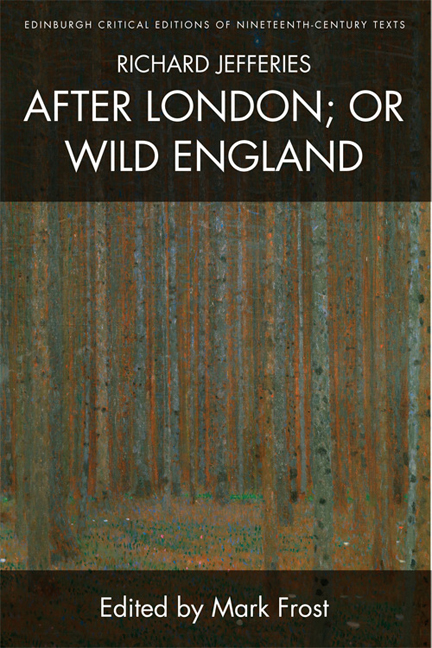Book contents
- Frontmatter
- Contents
- Introduction
- Further Reading
- A Richard Jefferies Chronology
- A Note on the Text
- After London; or Wild England
- Part I The Relapse into Barbarism
- Part II Wild England
- I Sir Felix
- II The House of Aquila
- III The Stockade
- IV The Canoe
- V Baron Aquila
- VI The Forest Track
- VII The Forest Track Continued
- VIII Thyma Castle
- IX Superstitions
- X The Feast
- XI Aurora
- XII Night in the Forest
- XIII Sailing Away
- XIV The Straits
- XV Sailing Onwards
- XVI The City
- XVII The Camp
- XVIII The King's Levy
- XIX Fighting
- XX In Danger
- XXI A Voyage
- XXII Discoveries
- XXIII Strange Things
- XXV Fiery Vapours
- XXV The Shepherds
- XXVI Bow and Arrow
- XXVII Surprised
- XXVIII For Aurora
- Appendices Supplementary writings by Richard Jefferies
X - The Feast
from Part II - Wild England
Published online by Cambridge University Press: 22 December 2017
- Frontmatter
- Contents
- Introduction
- Further Reading
- A Richard Jefferies Chronology
- A Note on the Text
- After London; or Wild England
- Part I The Relapse into Barbarism
- Part II Wild England
- I Sir Felix
- II The House of Aquila
- III The Stockade
- IV The Canoe
- V Baron Aquila
- VI The Forest Track
- VII The Forest Track Continued
- VIII Thyma Castle
- IX Superstitions
- X The Feast
- XI Aurora
- XII Night in the Forest
- XIII Sailing Away
- XIV The Straits
- XV Sailing Onwards
- XVI The City
- XVII The Camp
- XVIII The King's Levy
- XIX Fighting
- XX In Danger
- XXI A Voyage
- XXII Discoveries
- XXIII Strange Things
- XXV Fiery Vapours
- XXV The Shepherds
- XXVI Bow and Arrow
- XXVII Surprised
- XXVIII For Aurora
- Appendices Supplementary writings by Richard Jefferies
Summary
AT ten in the morning next day the feast began with a drama from Sophocles, which was performed in the open air. The theatre was in the gardens between the wall and the inner stockade; the spectators sat on the slope, tier above tier; the actors appeared upon a green terrace below, issuing from an arbour and passing off behind a thick box hedge on the other side of the terrace. There was no scenery whatever.
Aurora had selected the Antigone. There were not many dramatists from whom to choose, for so many English writers, once famous, had dropped out of knowledge and disappeared. Yet some of the far more ancient Greek and Roman classics remained because they contained depth and originality of ideas in small compass. They had been copied in MS. by thoughtful men from the old printed books before they mouldered away, and their MSS. being copied again, these works were handed down. The books which came into existence with printing had never been copied by the pen, and had consequently nearly disappeared. Extremely long and diffuse, it was found, too, that so many of them were but enlargements of ideas or sentiments which had been expressed in a few words by the classics. It is so much easier to copy an epigram of two lines than a printed book of hundreds of pages, and hence it was that Sophocles had survived while much more recent writers had been lost.
From a translation Aurora had arranged several of his dramas. Antigone was her favourite, and she wished Felix to see it. In some indefinable manner the spirit of the ancient Greeks seemed to her in accord with the times, for men had or appeared to have so little control over their own lives that they might well imagine themselves overruled by destiny. Communication between one place and another was difficult, the division of society into castes, and the iron tyranny of arms, prevented the individual from making any progress in lifting himself out of the groove in which he was born, except by the rarest opportunity, unless specially favoured by fortune. As men were born so they lived; they could not advance, and when this is the case the idea of Fate is always predominant.
- Type
- Chapter
- Information
- Richard Jefferies, After London; or Wild England , pp. 93 - 97Publisher: Edinburgh University PressPrint publication year: 2017

